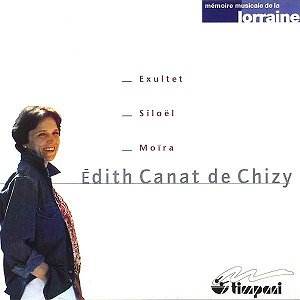|
|
Search MusicWeb Here |
|
 |
||
|
Founder:
Len Mullenger (1942-2025) Editor
in Chief:John Quinn
|
|
|
Search MusicWeb Here |
|
 |
||
|
Founder:
Len Mullenger (1942-2025) Editor
in Chief:John Quinn
|
 |
Edith CANAT DE CHIZY
(born 1950) Exultet (1995)a Siloël (1992) Moïra (1998)b Recorded: Arsenal, Metz, March and July 1998 |
| CD available for post-free online mail-order or you may download individual tracks. For some labels you can download the entire CD with a single click and make HUGE savings. The price you see is the price you pay! The full booklet notes are available on-line. | |
|
NOTE • Click on the button and you can buy the disc or read the booklet details • You can also access each track which you may then sample or down load. • Further Information. |
|
|
Edith Canat de Chizy studied at the Conservatoire National Supérieur de Musique in Paris as well as with Ivo Malec and Maurice Ohana. She further studied electro-acoustics with Guy Reibel and at the G.R.M. Her music combines logical musical thinking and expressive freedom; and the composer admits that "music is indissociable from contemplation and a state of prayer", and that her music aims at conveying her own personal experience in the best possible way. Some of her works, such as Exultet and Siloël recorded here, have a strong religious basis, and may – to a certain extent – call Messiaen to mind, e.g. the titles of the various interlinked sections of Exultet. Her music often brings Bartok, Dutilleux and Lutoslawski to mind, though Edith Canat de Chizy obviously manages to create her own sound world in a highly personal and individual way. Siloël for 12 solo strings was completed in 1992. In the Hebraic tradition, Siloël is the Angel of Energy. So, the outer sections of the piece have much energy indeed. The opening section is marked "very violent" and opens almost angrily, and the music moves ahead restlessly throughout, with short-lived attempts at melody. The central section, at first almost motionless, is a slow procession that tends towards ethereal regions. The closing section is again on the fast side though it has some calmer moments and ends very peacefully in mid-air.
The violin concerto Exultet was composed in 1995 and first performed by Laurent Korcia. Though cast in one single movement, it has several linked sections played without break alternating dynamic outbursts and contemplative meditation. (The title refers to an old Latin text sung during Easter night, and the titles of the sections refer either to the Apocalypse or to a book by Moody, Life after Life : Sheol – Colonnes de feu – Soleil immobile – Villes-lumière – Vision d’émeraude - Etang de feu – Voix-lumière – Mer de cristal – Trône céleste.) The demanding solo part is fully integrated in the orchestral fabric, more so than that of a traditional concerto; and the global impact of this beautiful work is rather that of a tone-poem. The contrasted moods suggested by the titles of the sub-sections are reflected in the refined sound world that the composer quite effectively conjures from her large orchestral forces, although these often have a chamber-like quality. The piece as a whole is strictly argued though the music has its share of freedom and controlled improvisation (much in the same way as Lutoslawski’s aleatory writing). Exultet is a marvellous piece of music that definitely should be eagerly taken-up by violinists willing to add a beautifully, and often movingly communicative modern piece to their repertoire. Moïra for cello and orchestra was completed in 1998 and first performed by the present performers in Metz. Again, a single movement made up of several sub-sections alternating harmonically tense episodes and more pensive or impassioned ones; the music is tightly argued and has a clear sense of direction though parts of the piece again allow from some controlled improvisation which the composer has learned – consciously or not – from Lutosławski. Moïra is, with Dutilleux’s Tout un monde lointain, one of the finest cello concertos of the late 20th Century, and an unquestioned masterpiece.
This is one of the finest releases I have recently come across. Such music of great beauty and of great communicative power came to me as a revelation. A wonderful release which I urge you to investigate. Unreservedly recommended.
Hubert Culot
|
|
ADDITIONAL INFORMATION •
You can sample only 30 seconds (or 15% if that is longer) of a given track. Select from the View tracks list. Each sample will normally start from the beginning but you can drag the slider to any position before pressing play. • PLEASE NOTE: If you are behind a firewall and the sound is prematurely terminated you may need to register Ludwig as a trusted source with your firewall software.
•You will need Quicktime to hear sound samples. Get a free Quicktime download here • If you cannot see the "Sample All Tracks" button you need to download Flash from here.
|
|
|
Return to Index |